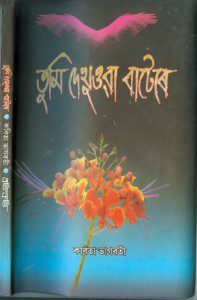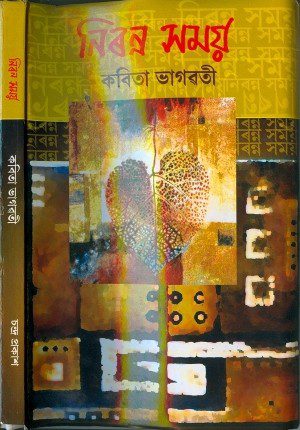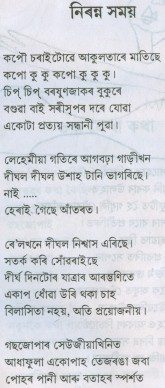
This time when I was home, I made a quick pick of two of the poetry collections. The idea is to explore the current poetic trend of Assamese literature. I was keener about making a selection on random basis rather than being specific or selective. While going through these poetic collections I somewhere added the sense of looking back into myself and experience the transformation in me. I realised that the trend of transformation in an individual is subject to nature and

the experiences that gets collected in due time. This seems to the thematic concern of poetries noted by Kobita Bhagawati in her collections called ‘Tumi Dekhuwa Batere’ and ‘Nirann’ Samay’. The core narrative approaches are related to the idea about time that continues and never learns to stop. A gradual growth and a simultaneous search for experience have been noted amidst the well knitted words of poetic evaluations of life and role of time over it. The amazing part of this collecting of poetry is its continuous appeal to the reader to meet the distanced past and then get related to the present. The writing has been so structured that the reader feels the in-depth, unsaid and veiled experiences of the poet in no time.
Reading through ‘Tumi Dekhuwa Batere’ was experienced like a journey amidst all those cultural and conventional trends that remain integral to one’s personality. The title poem ‘Tumi Dekhuwa Batere’ from the anthology ‘Tumi Dekhuwa Batere’ is a self interpreter of human mind that understands restrictions yet never forgets the flight of imagination and the sufferance of loneliness without a guide. You can glance through the poem as noted below –

Other poems like ‘Bandita Bandita’, Prajwalta Ashwash’, ‘Berot Ulomi thake Swadhinota’, ‘Jibon’ and ‘Marooudyan’ acts like eye openers in terms of social as well as personal peripheries. The writings of the poets are so straight that there leaves no space between the ideas and experiences of the poet and the reader. This acts as an magical way of engrossing the readers mind set an make him see through the changes and the transformations within and outside human race as a whole.
Narrations in ‘Nirann’ Samay’ adds the charm of maturity and the elements of expressing with bolder attitude and declarations. There is a very peculiarity noted about some of the poems that turns up unconventional and against the stream of conservative Assamese society. The declaration of the very first poem ‘Ulanga’ followed by ‘A-manuh’, ‘Nangath’ and ‘Tumar Bukut Jolise Jui’ are more about the kind of rebel and frustration that gets assessed in every modern heart. The sense of restlessness and helplessness get admired by the reader as it assists enough in sharing out the grief. There is the continuity in the words, especially when it is all about saying things that are against the accepted norms of humanity. The poem ‘Nirann Samay’ in particular stands like a sweet memorable journey amidst the beautiful natural ecstasies. There is the feeling of loss the helplessness about things that you can never keep to yourself. The poem is so precise yet so elaborative in making you feel the charm of human life that releases lots of experiences to be seen and just look over it without being a part of it. Read through the poem and you will realise the feelings that runs between the lines.

There is enough refreshment experienced within, as I went through these poems; but I must admit that somewhere they also made me think twice about my responsibilities and my participation for the society and myself. The language of the poet is intellectually delighting, yet is simple and subtle while comprehending the thoughts that are passed by. The stylistic appeal of these poems in ‘Tumi Dekhuwa Batere’ and ‘Nirann’ Samay’ follow a strange mode of second person declarations that are equally prosaic and poetic with spontaneity of her writing. Aspirations related to the purpose of meeting the demands of continuity have been established through the persuasion of the in-depth realisations and that adds humanitarian ideology. There is a difficult and illustrative use of ‘second-person idealisation that adds an extra scholarly charm to every narrative stroke of these poems. It is in a way difficult to follow compositions that are conversational and monologue at the same time. However, this seems to be a comfortable forte for the poet Kobita Bhagawati.



Leave a Reply